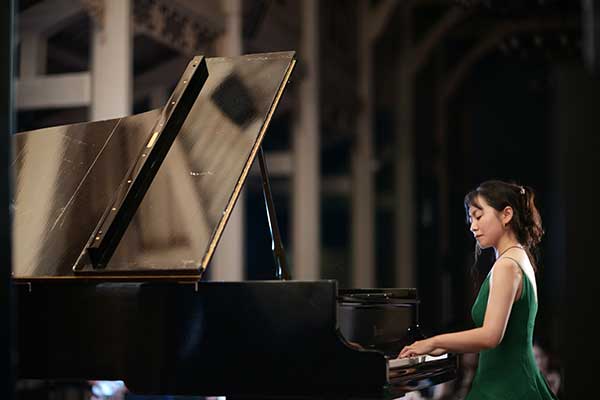

When a pianist steps onto the stage, their goal is not just to perform but to engage and captivate the audience. A successful concert hinges on selecting pieces that resonate emotionally, demonstrate technical prowess, and maintain the audience's interest from start to finish.
That is what pianist Wu Peixi plans to do when she gives a concert.
On Sunday, she will perform at the Anglican Art Centre, a new hub in Tianjin housed in the Anglican church, a historical landmark, an imposing Gothic-style structure whose foundations were laid in 1900.
On Friday, she will play at Spaceless in Shanghai, an art space housed in a former Union Church, which is more than 130 years old.
She has previously performed at Beijing's Mofan Bookstore, hidden in a hutong (alleyway) in the downtown area of the capital, which is also housed in a century-old church.
"For many pianists, crafting a compelling program is both an art and a science," Wu says. "When I prepared the music for the concerts, I designed for the old churches. The repertoire you choose can significantly influence the dynamic and the audience experience."
Compared to traditional concert halls, staging concerts in unconventional venues inspires and excites her as a pianist, the 37-year-old says.
Born into a musical family in Shanghai, Wu regularly attended classical concerts as a child. Her father, Wu Ying, and her mother, Shao Dan, are both pianists. As both of her parents gave classes at home, she has been listening to classical music from as early as she can remember. When she learned a new piece, she tried to remember the score quickly, then practiced it hard and frequently added her own interpretation.
"Music has been a part of my life, so I understand how much joy it brings to people," Wu Peixi says. "I want to create performances that linger in the minds of the audience long after the final note has been played."
A graduate of the Shanghai Conservatory of Music and the University of Music and Performing Arts in Vienna, she has staged recitals at home and abroad.
In 2023, she released her first album, Franz Schubert, playing the great Austrian composer's Piano Sonata No 16 and Four Impromptus.
"I did the recording in just a couple of hours in a beautiful studio in Tokyo," she recalls. "I felt the music flow out naturally from my hands and the whole recording was very smooth. At that moment, it just felt right to play the pieces."
For the first half of the concerts in Tianjin and Shanghai, she will play pieces such as Bach's Sheep May Safely Graze, BWV 208, Mozart's Piano Sonata in G Major, K283, and Brahms' Variations and Fugue on a Theme by Handel, Op 24. For the second half of the concerts, she will bring a sense of fun, humor and relaxation, with pieces from American composer William Bolcom's The Garden of Eden, and six excerpts from the late Ukrainian pianist Nikolai Kapustin's Preludes in Jazz Style, Op 53.
"I hope the diversity in the repertoire helps to sustain interest and offers a journey through different emotional landscapes," Wu Peixi says.
She adds that the reason for their inclusion was to draw more interest from younger audiences, as she has noticed in previous performances that children find it difficult to remain seated.
"Once, I performed in the bookstore in Beijing, and there were many children in the audience," she says. "They found it challenging to sit for nearly two hours for the concert so they stood up, walked around the bookstore, and came back to their seats.
"Beyond technical skill, the connection a pianist forges with the audience is crucial," she says, adding that this involves not only the personal interpretation of the music but also the ability to communicate emotions and narratives through performance.
"I hope that people coming to my concerts can have a memorable experience, from the music I chose for them, to the venues where we share music together," she says.